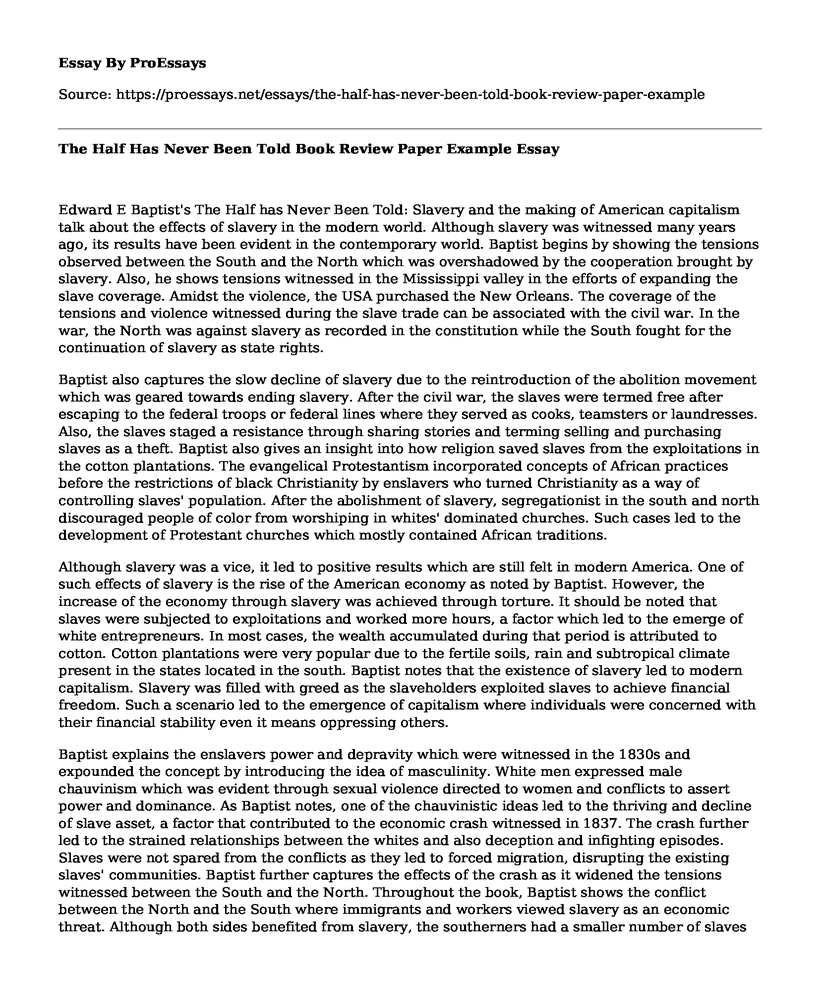Edward E Baptist's The Half has Never Been Told: Slavery and the making of American capitalism talk about the effects of slavery in the modern world. Although slavery was witnessed many years ago, its results have been evident in the contemporary world. Baptist begins by showing the tensions observed between the South and the North which was overshadowed by the cooperation brought by slavery. Also, he shows tensions witnessed in the Mississippi valley in the efforts of expanding the slave coverage. Amidst the violence, the USA purchased the New Orleans. The coverage of the tensions and violence witnessed during the slave trade can be associated with the civil war. In the war, the North was against slavery as recorded in the constitution while the South fought for the continuation of slavery as state rights.
Baptist also captures the slow decline of slavery due to the reintroduction of the abolition movement which was geared towards ending slavery. After the civil war, the slaves were termed free after escaping to the federal troops or federal lines where they served as cooks, teamsters or laundresses. Also, the slaves staged a resistance through sharing stories and terming selling and purchasing slaves as a theft. Baptist also gives an insight into how religion saved slaves from the exploitations in the cotton plantations. The evangelical Protestantism incorporated concepts of African practices before the restrictions of black Christianity by enslavers who turned Christianity as a way of controlling slaves' population. After the abolishment of slavery, segregationist in the south and north discouraged people of color from worshiping in whites' dominated churches. Such cases led to the development of Protestant churches which mostly contained African traditions.
Although slavery was a vice, it led to positive results which are still felt in modern America. One of such effects of slavery is the rise of the American economy as noted by Baptist. However, the increase of the economy through slavery was achieved through torture. It should be noted that slaves were subjected to exploitations and worked more hours, a factor which led to the emerge of white entrepreneurs. In most cases, the wealth accumulated during that period is attributed to cotton. Cotton plantations were very popular due to the fertile soils, rain and subtropical climate present in the states located in the south. Baptist notes that the existence of slavery led to modern capitalism. Slavery was filled with greed as the slaveholders exploited slaves to achieve financial freedom. Such a scenario led to the emergence of capitalism where individuals were concerned with their financial stability even it means oppressing others.
Baptist explains the enslavers power and depravity which were witnessed in the 1830s and expounded the concept by introducing the idea of masculinity. White men expressed male chauvinism which was evident through sexual violence directed to women and conflicts to assert power and dominance. As Baptist notes, one of the chauvinistic ideas led to the thriving and decline of slave asset, a factor that contributed to the economic crash witnessed in 1837. The crash further led to the strained relationships between the whites and also deception and infighting episodes. Slaves were not spared from the conflicts as they led to forced migration, disrupting the existing slaves' communities. Baptist further captures the effects of the crash as it widened the tensions witnessed between the South and the North. Throughout the book, Baptist shows the conflict between the North and the South where immigrants and workers viewed slavery as an economic threat. Although both sides benefited from slavery, the southerners had a smaller number of slaves leading to their outcry to end slavery.
Bibliography
Baptist, E. The half has never been told: Slavery and the making of American capitalism. New York: Basic Books, 2013.
Cite this page
The Half Has Never Been Told Book Review Paper Example. (2022, Oct 03). Retrieved from https://proessays.net/essays/the-half-has-never-been-told-book-review-paper-example
If you are the original author of this essay and no longer wish to have it published on the ProEssays website, please click below to request its removal:
- Essay Sample on Dorothea Dix
- Marketing Research Champion for Christ Essay
- Social and Demographic Trends in Workstations Paper Example
- Selecting the Right People for the Job: Assessing Selection Practices - Essay Sample
- Essay Example on Michelle Obama: A Symbol of Hope and Realistic Change
- Essay Example on the Lives of Marcus Garvey and Martin Luther King
- Proposing Action to Enhance Career Planning & Retain Talented Employees - Essay Sample







